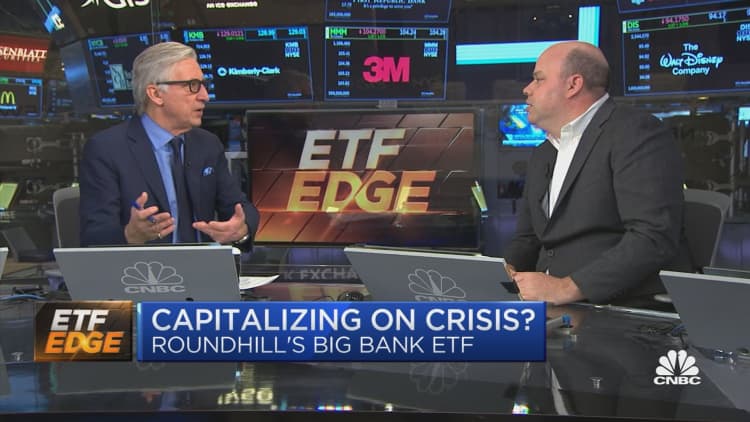
As regional banks continue to recover amid the fallout from the Silicon Valley Bank collapse, the exchange-traded fund industry is moving quickly with new products to address the turbulence.
Roundhill Investments launched its new Big Bank ETF (BIGB) on Tuesday in response to the banking crisis. The fund includes no regional banks but holds equally weighted positions in six institutions: Bank of America, Citigroup, Goldman Sachs, JPMorgan Chase, Morgan Stanley and Wells Fargo.
"These are the banks that actually stand to benefit from this turmoil, and that we believe are going to offer investors potentially the opportunity to do better than what we have seen," Dave Mazza, chief strategy officer at Roundhill Investments, told Bob Pisani on CNBC's "ETF Edge" on Monday.
Mazza's fund has a gross expense ratio of 0.29%. Comparably, the SPDR S&P Bank ETF (KBE) holds a 0.35% ratio. According to Roundhill, the BIGB balances on a quarterly basis and reconstitutes on an annual basis.
The launch of the ETF comes as larger banks are increasingly being seen as relative safe havens in the sector, while regional bank stocks remain volatile this week. First Republic Bank (FRC) shares soared more than 29% on Tuesday before retreating midweek. The SPDR S&P Regional Banking ETF (KRE) also gave up gains during Wednesday's session.
"Investors shouldn't just jump to this because banks are in the news, and both the good and the bad that comes with it," Todd Rosenbluth, head of research at VettaFi, said Monday in the same segment.
"In fact, that might be a reason of risk," he continued, "You may want to steer clear of financials because you have it within your portfolio."
According to Rosenbluth, financial ETFs have garnered 51% of the sector traffic on VettaFi sites in the past week, compared with 12% the week prior and 5% at the start of the year.
"You want to make sure that you're researching for the right reasons," he said. "You could either be buying, you could be selling. You shouldn't just go into financials just because it's making the headlines."
As a result of the banking crisis in recent weeks, financial institutions are facing increased government regulations. The Fed already has launched its own internal review about the oversight of SVB and Signature, which it says will be released by May 1.
"I don't think many could have predicted the turmoil that we're seeing today," Mazza said. "In a crisis of confidence, where really investors are going and picking and choosing any areas of weakness, the idea that investors are now going to have the opportunity to gain that financial exposure without the dilution that they're going to potentially get with other potential ETFs is really exciting."
For investors seeking to gain exposure to large banks, Rosenbluth stressed the importance of understanding what a particular fund is composed of.
"In value ETFs, in particular, [financials] is the heavyweight," he said. "With these sector ETFs in general, and more concentrated ETFs, you really want to make sure you want to overweight them."





